Unit 20 An ordinary life Lesson 40 课件(60张PPT)
文档属性
| 名称 | Unit 20 An ordinary life Lesson 40 课件(60张PPT) |
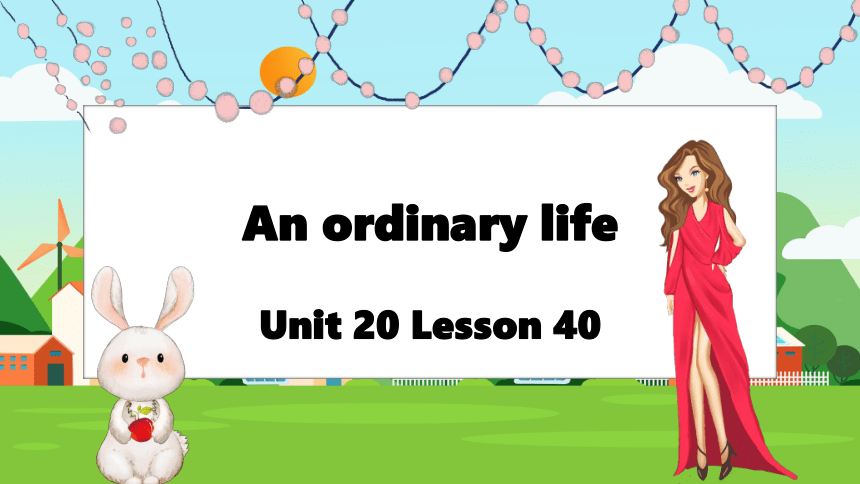
|
|
| 格式 | pptx | ||
| 文件大小 | 39.0MB | ||
| 资源类型 | 试卷 | ||
| 版本资源 | 新概念英语 | ||
| 科目 | 英语 | ||
| 更新时间 | 2024-09-09 00:00:00 | ||
图片预览

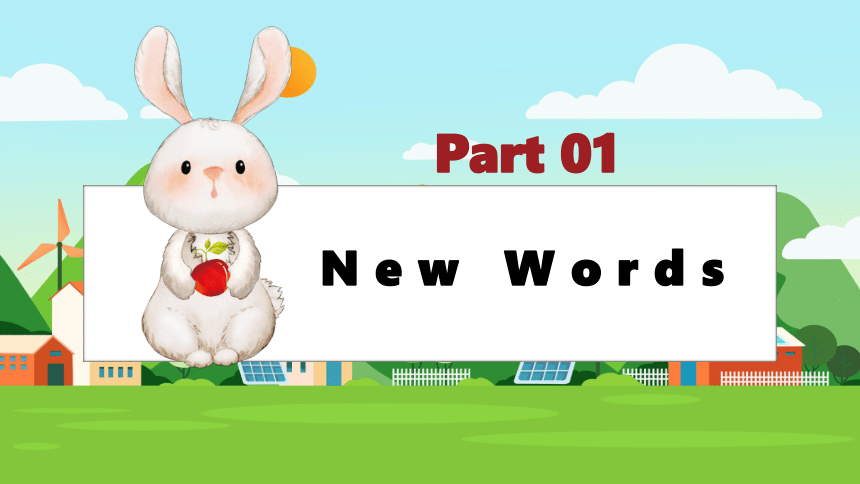
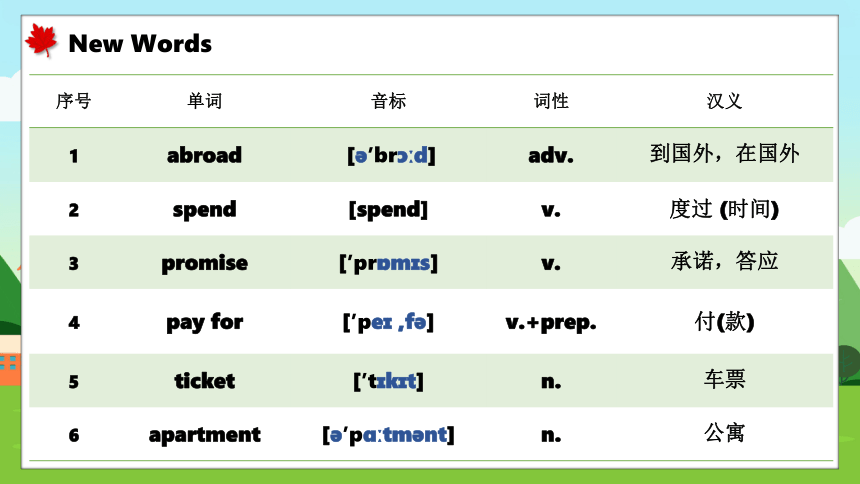
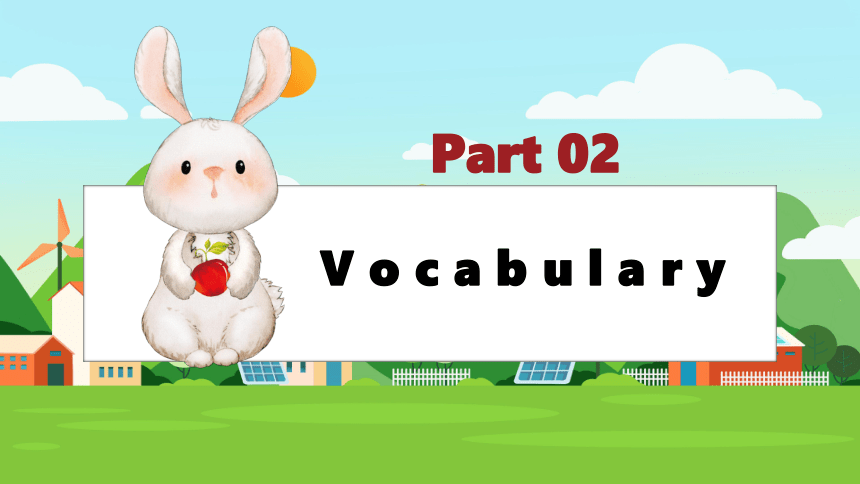
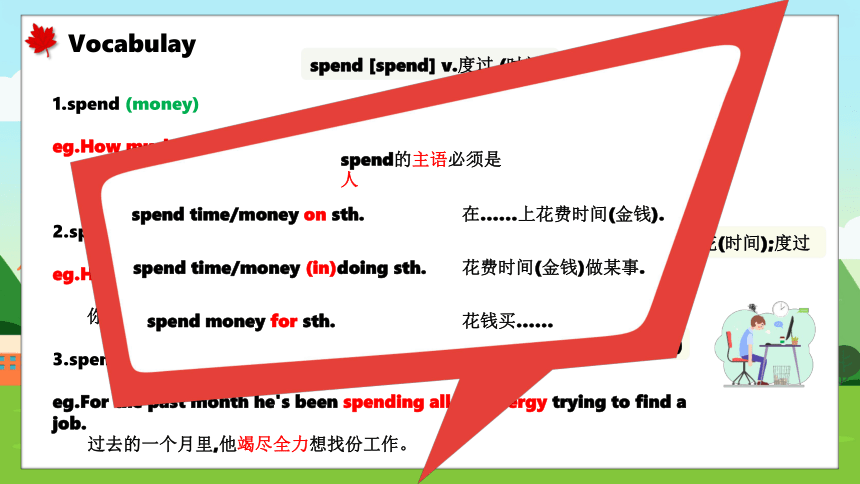
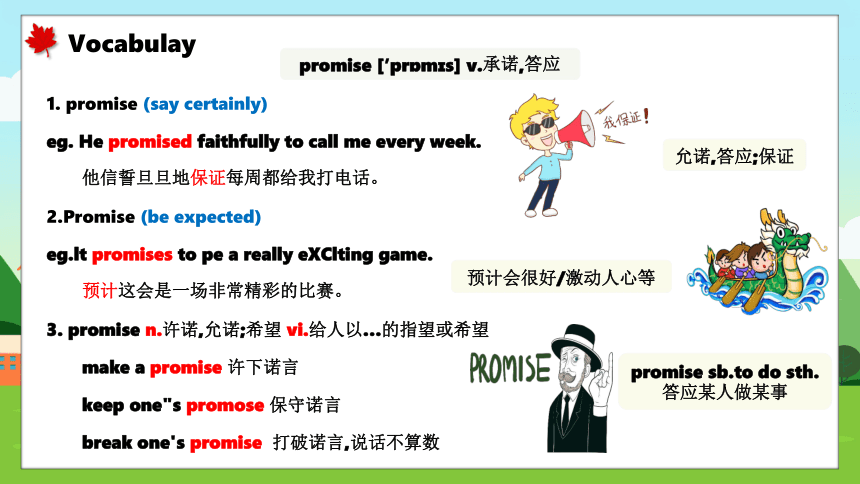
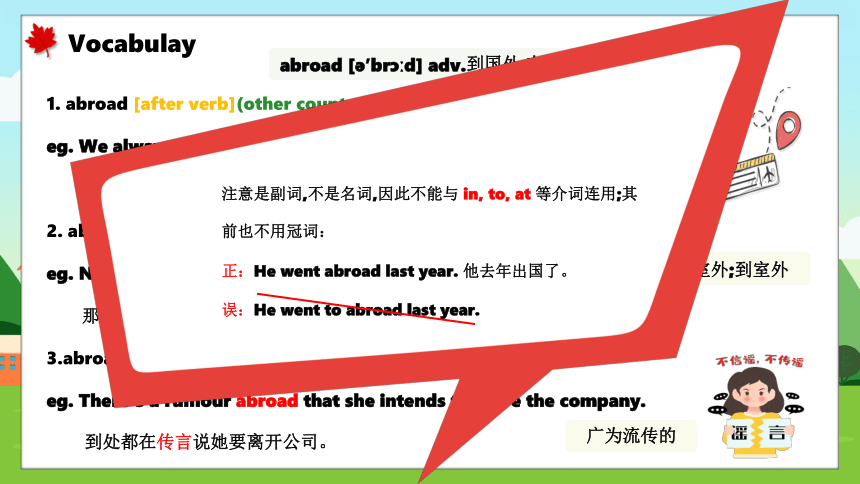
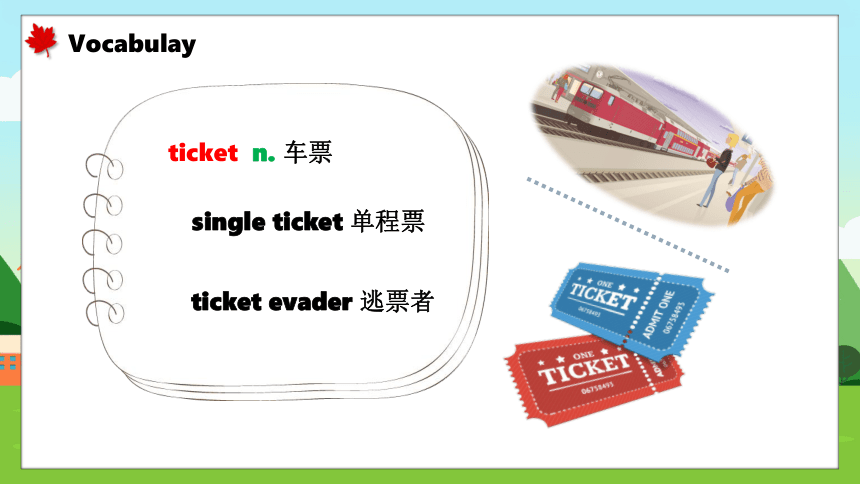

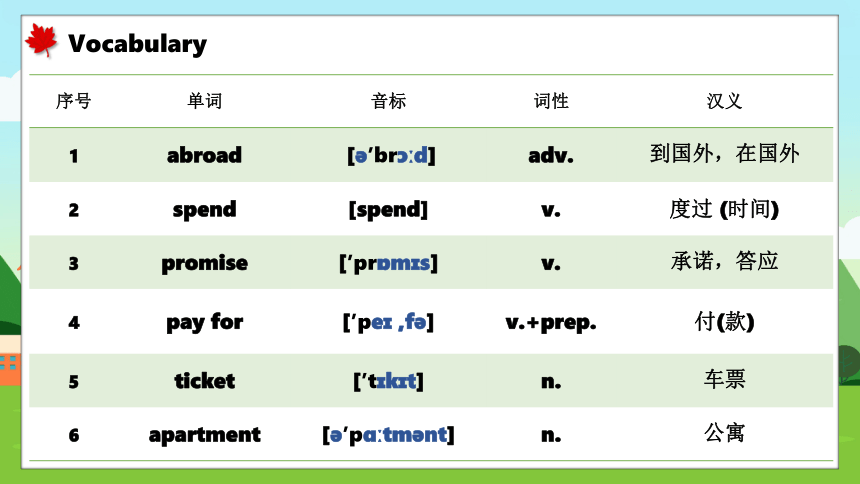
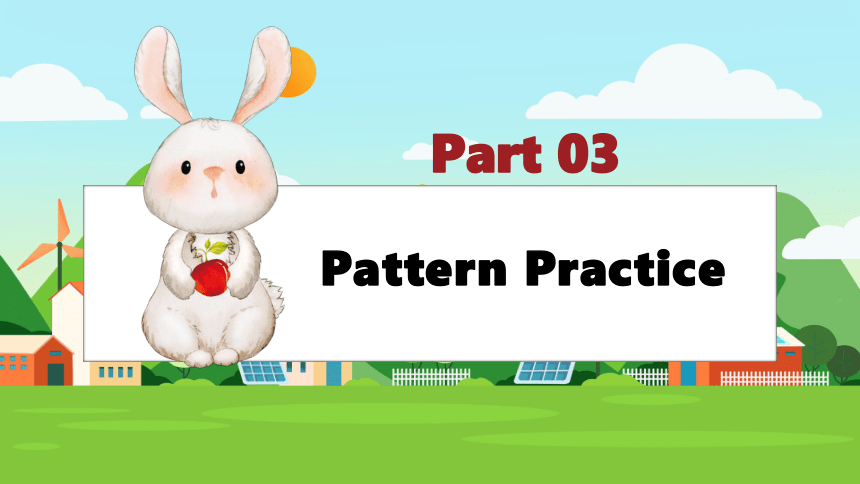
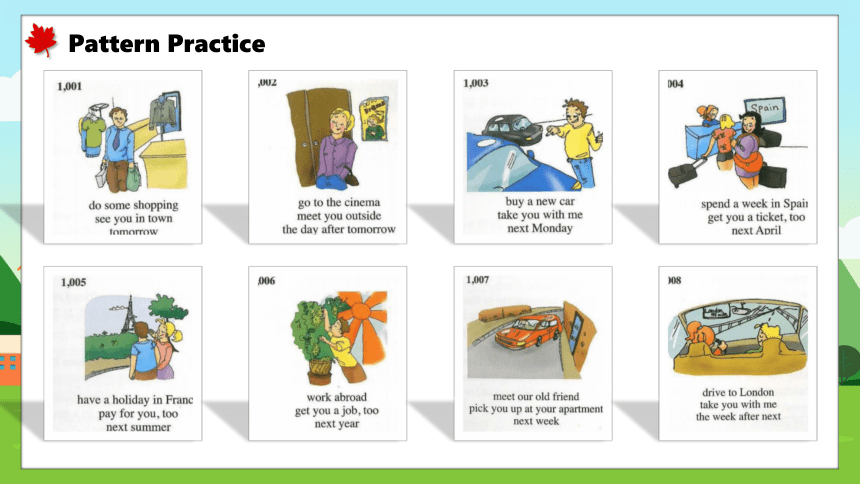
文档简介
(共60张PPT)
An ordinary life
Unit 20 Lesson 40
Part 01
New Words
序号 单词 音标 词性 汉义
1 abroad [ ′br d] adv. 到国外,在国外
2 spend [spend] v. 度过 (时间)
3 promise [′pr m s] v. 承诺,答应
4 pay for [′pe ,f ] v.+prep. 付(款)
5 ticket [′t k t] n. 车票
6 apartment [ ′pɑ tm nt] n. 公寓
New Words
Part 02
Vocabulary
消耗,花费(精力等);(尤指)用尽(全力)
Vocabulay
spend [spend] v.度过 (时间)
1.spend (money)
2.spend (time)
3.spend (force)
eg.How much did you spend
eg.How long do you spend on your homework
eg.For the past month he's been spending all his energy trying to find a job.
花费;用,花(钱)
花(时间);度过
过去的一个月里,他竭尽全力想找份工作。
你做家庭作业用多长时间
你花了多少钱
spend的主语必须是人
spend time/money on sth.
spend time/money (in)doing sth.
spend money for sth.
在……上花费时间(金钱).
花费时间(金钱)做某事.
花钱买……
promise sb.to do sth.
答应某人做某事
Vocabulay
promise [′pr m s] v.承诺,答应
1. promise (say certainly)
2.Promise (be expected)
3. promise n.许诺,允诺;希望 vi.给人以…的指望或希望
eg. He promised faithfully to call me every week.
eg.lt promises to pe a really eXClting game.
make a promise 许下诺言
允诺,答应;保证
预计会很好/激动人心等
keep one"s promose 保守诺言
预计这会是一场非常精彩的比赛。
他信誓旦旦地保证每周都给我打电话。
break one's promise 打破诺言,说话不算数
Vocabulay
abroad [ ′br d] adv.到国外,在国外
1. abroad [after verb](other country)
在国外;到国外
eg. We always go abroad in the summer.
我们夏天总是到国外去。
2. abroad [after verb] (outside)
在室外;到室外
eg. Not a soul was abroad that morning.
那天上午,户外空无一人。
3.abroad [after verb] (going around)
广为流传的
eg. There's a rumour abroad that she intends to leave the company.
到处都在传言说她要离开公司。
注意是副词,不是名词,因此不能与 in, to, at 等介词连用;其前也不用冠词:
正:He went abroad last year. 他去年出国了。
误:He went to abroad last year.
ticket n. 车票
ticket evader 逃票者
single ticket 单程票
Vocabulay
pay for……
pay for sth 为……付出代价
赔偿;为…而付钱;为…付出代价
to pay cash for
付现金;现钱购买
Vocabulay
pay for v+prep.付款
序号 单词 音标 词性 汉义
1 abroad [ ′br d] adv. 到国外,在国外
2 spend [spend] v. 度过 (时间)
3 promise [′pr m s] v. 承诺,答应
4 pay for [′pe ,f ] v.+prep. 付(款)
5 ticket [′t k t] n. 车票
6 apartment [ ′pɑ tm nt] n. 公寓
Vocabulary
Part 03
Pattern Practice
Pattern Practice
Pattern Practice
A:What are you going to do tomorrow
B:I'm going to do some shopping.
A:Are you going to do some shopping tomorrow
B:Yes, l am.
A:Can l come, too
B:Yes, of course.I'll see you in town.
A:You're going to do some shopping, aren't you
B:Yes, l am. Do you want to do some shopping, too
A:Yes.I'll see you in town.
A:Are you going to do some shopping tomorrow
B:Yes,I am. And I'll see you in town. l promise.
A:Are you going to go to the cinema the day after tomorrow
B:Yes,I am. And I’ll meet you outside. l promise.
A:What are you going to do the day after tomorrow
B:I'm going to go to the cinema.
Pattern Practice
A:Are you going to go to the cinema the day after tomorrow
B:Yes, l am.
A:Can l come, too
B:Yes, of course.I'll meet you outside.
A:You're going to go to the cinema, aren't you
B:Yes, l am. Do you want to go to the cinema, too
A:Yes.I’ll meet you outside.
A:Are you going to buy a new car next Monday
B:Yes,I am. And I’ll take you with me. l promise.
A:What are you going to do next Monday
B:I'm going to buy a new car.
Pattern Practice
A:Are you going to buy a new car next Monday
B:Yes, l am.
A:Can l come, too
B:Yes, of course.I’ll take you with me.
A:You're going to buy a new car, aren't you
B:Yes, l am. Do you want to buy a new car, too
A:Yes.I’ll take you with me .
A:Are you going to spend a week in Spain next April
B:Yes,I am. And I’ll get you a ticket,too. l promise.
A:What are you going to do next April
B:I'm going to spend a week in Spain.
Pattern Practice
A:Are you going to spend a week in Spain next April
B:Yes, l am.
A:Can l come, too
B:Yes, of course.I’ll get you a ticket,too.
A:You're going to spend a week in Spain, aren't you
B:Yes, l am. Do you want to spend a week in Spain, too
A:Yes.I’ll get you a ticket,too.
A:Are you going to have a holiday in France next summer
B:Yes,I am. And I’ll pay for you,too. l promise.
A:What are you going to do next summer
B:I'm going to have a holiday in France.
Pattern Practice
A:Are you going to have a holiday in France next summer
B:Yes, l am.
A:Can l come, too
B:Yes, of course.I’ll pay for you,too.
A:You're going to have a holiday in France, aren't you
B:Yes, l am. Do you want to have a holiday in France, too
A:Yes.I’ll pay for you,too.
A:Are you going to work abroad next year
B:Yes,I am. And I’ll get you a job,too. l promise.
A:What are you going to do next year
B:I'm going to work abroad.
Pattern Practice
A:Are you going to work abroad next year
B:Yes, l am.
A:Can l come, too
B:Yes, of course.I’ll get you a job,too.
A:You're going to work abroad, aren't you
B:Yes, l am. Do you want to work a broad, too
A:Yes.I’ll get you a job,too.
A:Are you going to meet our old friend next week
B:Yes,I am. And I’ll pick you up at your apartment. l promise.
A:What are you going to do next week
B:I'm going to meet our old friend.
Pattern Practice
A:Are you going to meet our old friend next week
B:Yes, l am.
A:Can l come, too
B:Yes, of course.I’ll pick you up at your apartment.
A:You're going to meet our old friend, aren't you
B:Yes, l am. Do you want to meet our old friend, too
A:Yes.I’ll pick you up at your apartment.
A:Are you going to drive to London the week after next
B:Yes,I am. And I’ll take you with me. l promise.
A:What are you going to do the week after next
B:I'm going to drive to London.
Pattern Practice
A:Are you going to drive to London the week after next
B:Yes, l am.
A:Can l come, too
B:Yes, of course.I’ll take you with me.
A:You're going to drive to London, aren't you
B:Yes, l am. Do you want to drive to London, too
A:Yes.I’ll take you with me.
Part 04
Grammars
将来时
句型构成
主语+will (用于第二、三人称)/shall(只用于第一人称)+动词原形.
使用时机
表示将来某个时间点要发生的事
表示不以人意志为转移的自然发展的事
表示征询对方意图或愿望时
表示即将要做的动作或决定
Grammars
主语+ be(am,is,are)going to+动词原形.
两者有什么区别呢?
将来时
be going to
will / shall
表示近期、眼下就要发生的事情
He is going to write a letter tonight.
表示根据主观判断将来肯定发生的事情
He is seriously ill.He is going to die.
含有“计划,打算”的意思
She is going to lend us her book.
表示的将来时间则较远一些
He will write a book one day.
表示客观上将来势必发生的事情.
He will be twenty years old.
He will be here in half an hour.
没有“计划,打算”的意思
Grammars
主观判断
客观要发生
计划打算好做某事
临时决定去做某事
有迹象的预测
没有迹象的预测
She is going to swim tomorrow.
She isn’t going to swim tomorrow.
Is she going to swim tomorrow
What is she going to do tomorrow
Positive
Negative
Simple Q
Wh-Q
主语 + be going to + 动词原形 .
主语 + be not going to + 动词原形 .
Be +主语 + going to +动词原形 ?
特殊疑问词 + be +主语 + going to + 动词原形 ?
Grammars
What will she do one day
She will meet the right man one day.
She won’t meet the right man one day.
Will she meet the right man one day
Positive
Negative
Simple Q
Wh-Q
主语 + will + 动词原形 .
主语 + will not/won’t + 动词原形 .
Will +主语 + 动词原形 ?
特殊疑问词 + will +主语 + 动词原形 ?
Grammars
tomorrow
Grammars
next week
next month
two days later
明天
下周
下个月
两天后
Da Ming will be back in 5 minures.
When will Da Ming come back
Yes, in five minutes.
表示多久之后
明天下个XX后
in加段时表将来
时间标志词
Future
Tomorrow
the day after tomorrow
next Monday
next July
next winter
next week/month
next year
the week after
next the month/year
after next
Past
yesterday
the day before yesterday
last Monday
last July
last winter
last week/month
last year
the week before last
the month/year
before last
Pattern Practice
Part 05
Pronunciation
want to change
last Monday
won’t she
friends
Pronunciation
1.This is my last fashion shoot.
I want to tell you something.
I won’t see you next Monday.
He’s going to spend the weekend there.
Will she ask Nina
I’m looking forward to my coffee.
I (want ) to go (next) July.
She (got )Daisy a (ticket ), too.
What (did) Daisy say
Why (won’t )she (ask )Jack
I (watched) TV (last ) night.
She( went )to the (dentist’s ) yesterday.
(Did) Jack (invite )Daisy (to )travel with him
闯关成功
Part 07
Practice
Practice
A:You're going to do some shopping, aren't you
B:Yes, l am. Do you want to do some shopping, too
A:Yes.I'll see you in town.
A:Are you going to do some shopping tomorrow
B:Yes,I am. And I'll see you in town. l promise.
Practice
Who is Nina talking to
What will this be, her first or her last fashion shoot
What kind of a job is she going to get, and where
Is she a successful model now, or not Will she always be successful What kind of a life does she want (Use …, but and …, and)
What will she do in an office job (regular hours/ home in the evening / beautiful meals / eat with friends/ same bed every night)
When will she (maybe) meet the right man What kind of a life will they have together (Use …. and)
1. Nina is talking to Daisy.
2. This will be her last fashion shoot.
3. She is going to get an ordinary job in an office.
4. She is successful now, but I won’t always be successful. And she wants an ordinary life.
5. In an office job, she’ ll work regular hours. She’ll go home in the evening. She’ll cook beautiful meals, and eats them with her friends. And she’ll sleep in the same bed every night.
6. Maybe, one day, she’ll meet the right man. And they’ll have an ordinary life together.
Nina is talking to Daisy. This will be her last fashion shoot. She is going to get an ordinary job in an office. She is successful now, but I won’t always be successful. And she wants an ordinary life. In an office job, she’ ll work regular hours. She’ll go home in the evening. She’ll cook beautiful meals, and eats them with her friends. And she’ll sleep in the same bed every night. Maybe, one day, she’ll meet the right man. And they’ll have an ordinary life together.
Practice
JULY
Sunday 2nd Day out in the country with John.
Monday 3rd 7.30 Go to theatre with Jane.
Tuesday 4th Take photographs for
Daisy-all day.
Wednesday 5th 10.30 dentist’s.
2.30-3.30 Music lesson.
Thursday 6th Morning—take Nina to
a photo shoot and wait.
Friday 7th Day in London. Stay in hotel.
Saturday 8th Back from London.
Afternoon—football.
Begin like this and continue it:
FRIEND: Can you come to a party next
Friday evening
You: No, I'm sorry. I'll be in London.
FRIEND: Can you come to the beach on
Wednesday morning
You: No, I can't.I'll be at the
dentist's. Sorry.
FRIEND: What about next Tuesday
I‘m going to drive to London.
Do you want to come
You: ...
Practice
Karen : You won’t remember your fourth birthday, Lucy, but I remember it very well. It was a beautiful autumn day. I put some food in a basket, and we all went to the lake in the park. You played in the water. Then we had tea. I had some little chocolate biscuits in the basket, and I gave you one. Of course, you wanted a second one, then a third, then a fourth, then a fifth. I wanted to say, ‘No.’ But your father said, ‘ Don’t say ‘No” to her today. It’s her birthday. We want her to be happy. And I said, ‘But she won’t be happy. She’ll be sick!’Your father said, ‘OK, she’ll be sick, and she’ll learn.’ But you weren’t sick, and you didn’t learn. You still like chocolate. But you like expensive chocolate now.
Practice
Four.
To the lake in the park.
Some little chocolate biscuits.
Yes,she did.
She wanted to say ‘No’.
No. He wanted Lucy to be happy.
No, she wasn’t.
No, she didn’t.
Practice
1.The story happened a few years ago. How old was Lucy at the time
2. Where did the family go
3. What did Karen have in the basket
4. Did Lucy like them
5. What did Karen want to do
6. Did William agree
7. Was Lucy sick
8. Did she learn?late
This will be my last day in this job!
You won’t always be successful, you know.
Are you going to bed early
Can you give this to Ann, please
Sleep well!
What are you going to do tomorrow
No. I won’t. You’re right.
I’m not sure. I’ll stay at home, I think.
No. I’m not. I went to bed early last night.
Will it Lucky you!
I will! I’m very tired.
Yes, and this is for you from Ann.
Practice
PLAY
1.This my last fashion shoot. (pic.2)
be
going to be
was
will be
2.Why do you want____________ (pic.2)
changed
will change
changed
to change
3.I’m successful now, But I always be successful. (pic.2)
will
am not
not
won’t
4.In a office job, _______ regular hours. (pic.4)
I work
I’m working
I worked
I’ll work
5.And maybe, one day, _______ the right man . (pic. 6)
I meet
I met
I’m going to meet
I’ll meet
闯关成功
Thank you!
An ordinary life
Unit 20 Lesson 40
Part 01
New Words
序号 单词 音标 词性 汉义
1 abroad [ ′br d] adv. 到国外,在国外
2 spend [spend] v. 度过 (时间)
3 promise [′pr m s] v. 承诺,答应
4 pay for [′pe ,f ] v.+prep. 付(款)
5 ticket [′t k t] n. 车票
6 apartment [ ′pɑ tm nt] n. 公寓
New Words
Part 02
Vocabulary
消耗,花费(精力等);(尤指)用尽(全力)
Vocabulay
spend [spend] v.度过 (时间)
1.spend (money)
2.spend (time)
3.spend (force)
eg.How much did you spend
eg.How long do you spend on your homework
eg.For the past month he's been spending all his energy trying to find a job.
花费;用,花(钱)
花(时间);度过
过去的一个月里,他竭尽全力想找份工作。
你做家庭作业用多长时间
你花了多少钱
spend的主语必须是人
spend time/money on sth.
spend time/money (in)doing sth.
spend money for sth.
在……上花费时间(金钱).
花费时间(金钱)做某事.
花钱买……
promise sb.to do sth.
答应某人做某事
Vocabulay
promise [′pr m s] v.承诺,答应
1. promise (say certainly)
2.Promise (be expected)
3. promise n.许诺,允诺;希望 vi.给人以…的指望或希望
eg. He promised faithfully to call me every week.
eg.lt promises to pe a really eXClting game.
make a promise 许下诺言
允诺,答应;保证
预计会很好/激动人心等
keep one"s promose 保守诺言
预计这会是一场非常精彩的比赛。
他信誓旦旦地保证每周都给我打电话。
break one's promise 打破诺言,说话不算数
Vocabulay
abroad [ ′br d] adv.到国外,在国外
1. abroad [after verb](other country)
在国外;到国外
eg. We always go abroad in the summer.
我们夏天总是到国外去。
2. abroad [after verb] (outside)
在室外;到室外
eg. Not a soul was abroad that morning.
那天上午,户外空无一人。
3.abroad [after verb] (going around)
广为流传的
eg. There's a rumour abroad that she intends to leave the company.
到处都在传言说她要离开公司。
注意是副词,不是名词,因此不能与 in, to, at 等介词连用;其前也不用冠词:
正:He went abroad last year. 他去年出国了。
误:He went to abroad last year.
ticket n. 车票
ticket evader 逃票者
single ticket 单程票
Vocabulay
pay for……
pay for sth 为……付出代价
赔偿;为…而付钱;为…付出代价
to pay cash for
付现金;现钱购买
Vocabulay
pay for v+prep.付款
序号 单词 音标 词性 汉义
1 abroad [ ′br d] adv. 到国外,在国外
2 spend [spend] v. 度过 (时间)
3 promise [′pr m s] v. 承诺,答应
4 pay for [′pe ,f ] v.+prep. 付(款)
5 ticket [′t k t] n. 车票
6 apartment [ ′pɑ tm nt] n. 公寓
Vocabulary
Part 03
Pattern Practice
Pattern Practice
Pattern Practice
A:What are you going to do tomorrow
B:I'm going to do some shopping.
A:Are you going to do some shopping tomorrow
B:Yes, l am.
A:Can l come, too
B:Yes, of course.I'll see you in town.
A:You're going to do some shopping, aren't you
B:Yes, l am. Do you want to do some shopping, too
A:Yes.I'll see you in town.
A:Are you going to do some shopping tomorrow
B:Yes,I am. And I'll see you in town. l promise.
A:Are you going to go to the cinema the day after tomorrow
B:Yes,I am. And I’ll meet you outside. l promise.
A:What are you going to do the day after tomorrow
B:I'm going to go to the cinema.
Pattern Practice
A:Are you going to go to the cinema the day after tomorrow
B:Yes, l am.
A:Can l come, too
B:Yes, of course.I'll meet you outside.
A:You're going to go to the cinema, aren't you
B:Yes, l am. Do you want to go to the cinema, too
A:Yes.I’ll meet you outside.
A:Are you going to buy a new car next Monday
B:Yes,I am. And I’ll take you with me. l promise.
A:What are you going to do next Monday
B:I'm going to buy a new car.
Pattern Practice
A:Are you going to buy a new car next Monday
B:Yes, l am.
A:Can l come, too
B:Yes, of course.I’ll take you with me.
A:You're going to buy a new car, aren't you
B:Yes, l am. Do you want to buy a new car, too
A:Yes.I’ll take you with me .
A:Are you going to spend a week in Spain next April
B:Yes,I am. And I’ll get you a ticket,too. l promise.
A:What are you going to do next April
B:I'm going to spend a week in Spain.
Pattern Practice
A:Are you going to spend a week in Spain next April
B:Yes, l am.
A:Can l come, too
B:Yes, of course.I’ll get you a ticket,too.
A:You're going to spend a week in Spain, aren't you
B:Yes, l am. Do you want to spend a week in Spain, too
A:Yes.I’ll get you a ticket,too.
A:Are you going to have a holiday in France next summer
B:Yes,I am. And I’ll pay for you,too. l promise.
A:What are you going to do next summer
B:I'm going to have a holiday in France.
Pattern Practice
A:Are you going to have a holiday in France next summer
B:Yes, l am.
A:Can l come, too
B:Yes, of course.I’ll pay for you,too.
A:You're going to have a holiday in France, aren't you
B:Yes, l am. Do you want to have a holiday in France, too
A:Yes.I’ll pay for you,too.
A:Are you going to work abroad next year
B:Yes,I am. And I’ll get you a job,too. l promise.
A:What are you going to do next year
B:I'm going to work abroad.
Pattern Practice
A:Are you going to work abroad next year
B:Yes, l am.
A:Can l come, too
B:Yes, of course.I’ll get you a job,too.
A:You're going to work abroad, aren't you
B:Yes, l am. Do you want to work a broad, too
A:Yes.I’ll get you a job,too.
A:Are you going to meet our old friend next week
B:Yes,I am. And I’ll pick you up at your apartment. l promise.
A:What are you going to do next week
B:I'm going to meet our old friend.
Pattern Practice
A:Are you going to meet our old friend next week
B:Yes, l am.
A:Can l come, too
B:Yes, of course.I’ll pick you up at your apartment.
A:You're going to meet our old friend, aren't you
B:Yes, l am. Do you want to meet our old friend, too
A:Yes.I’ll pick you up at your apartment.
A:Are you going to drive to London the week after next
B:Yes,I am. And I’ll take you with me. l promise.
A:What are you going to do the week after next
B:I'm going to drive to London.
Pattern Practice
A:Are you going to drive to London the week after next
B:Yes, l am.
A:Can l come, too
B:Yes, of course.I’ll take you with me.
A:You're going to drive to London, aren't you
B:Yes, l am. Do you want to drive to London, too
A:Yes.I’ll take you with me.
Part 04
Grammars
将来时
句型构成
主语+will (用于第二、三人称)/shall(只用于第一人称)+动词原形.
使用时机
表示将来某个时间点要发生的事
表示不以人意志为转移的自然发展的事
表示征询对方意图或愿望时
表示即将要做的动作或决定
Grammars
主语+ be(am,is,are)going to+动词原形.
两者有什么区别呢?
将来时
be going to
will / shall
表示近期、眼下就要发生的事情
He is going to write a letter tonight.
表示根据主观判断将来肯定发生的事情
He is seriously ill.He is going to die.
含有“计划,打算”的意思
She is going to lend us her book.
表示的将来时间则较远一些
He will write a book one day.
表示客观上将来势必发生的事情.
He will be twenty years old.
He will be here in half an hour.
没有“计划,打算”的意思
Grammars
主观判断
客观要发生
计划打算好做某事
临时决定去做某事
有迹象的预测
没有迹象的预测
She is going to swim tomorrow.
She isn’t going to swim tomorrow.
Is she going to swim tomorrow
What is she going to do tomorrow
Positive
Negative
Simple Q
Wh-Q
主语 + be going to + 动词原形 .
主语 + be not going to + 动词原形 .
Be +主语 + going to +动词原形 ?
特殊疑问词 + be +主语 + going to + 动词原形 ?
Grammars
What will she do one day
She will meet the right man one day.
She won’t meet the right man one day.
Will she meet the right man one day
Positive
Negative
Simple Q
Wh-Q
主语 + will + 动词原形 .
主语 + will not/won’t + 动词原形 .
Will +主语 + 动词原形 ?
特殊疑问词 + will +主语 + 动词原形 ?
Grammars
tomorrow
Grammars
next week
next month
two days later
明天
下周
下个月
两天后
Da Ming will be back in 5 minures.
When will Da Ming come back
Yes, in five minutes.
表示多久之后
明天下个XX后
in加段时表将来
时间标志词
Future
Tomorrow
the day after tomorrow
next Monday
next July
next winter
next week/month
next year
the week after
next the month/year
after next
Past
yesterday
the day before yesterday
last Monday
last July
last winter
last week/month
last year
the week before last
the month/year
before last
Pattern Practice
Part 05
Pronunciation
want to change
last Monday
won’t she
friends
Pronunciation
1.This is my last fashion shoot.
I want to tell you something.
I won’t see you next Monday.
He’s going to spend the weekend there.
Will she ask Nina
I’m looking forward to my coffee.
I (want ) to go (next) July.
She (got )Daisy a (ticket ), too.
What (did) Daisy say
Why (won’t )she (ask )Jack
I (watched) TV (last ) night.
She( went )to the (dentist’s ) yesterday.
(Did) Jack (invite )Daisy (to )travel with him
闯关成功
Part 07
Practice
Practice
A:You're going to do some shopping, aren't you
B:Yes, l am. Do you want to do some shopping, too
A:Yes.I'll see you in town.
A:Are you going to do some shopping tomorrow
B:Yes,I am. And I'll see you in town. l promise.
Practice
Who is Nina talking to
What will this be, her first or her last fashion shoot
What kind of a job is she going to get, and where
Is she a successful model now, or not Will she always be successful What kind of a life does she want (Use …, but and …, and)
What will she do in an office job (regular hours/ home in the evening / beautiful meals / eat with friends/ same bed every night)
When will she (maybe) meet the right man What kind of a life will they have together (Use …. and)
1. Nina is talking to Daisy.
2. This will be her last fashion shoot.
3. She is going to get an ordinary job in an office.
4. She is successful now, but I won’t always be successful. And she wants an ordinary life.
5. In an office job, she’ ll work regular hours. She’ll go home in the evening. She’ll cook beautiful meals, and eats them with her friends. And she’ll sleep in the same bed every night.
6. Maybe, one day, she’ll meet the right man. And they’ll have an ordinary life together.
Nina is talking to Daisy. This will be her last fashion shoot. She is going to get an ordinary job in an office. She is successful now, but I won’t always be successful. And she wants an ordinary life. In an office job, she’ ll work regular hours. She’ll go home in the evening. She’ll cook beautiful meals, and eats them with her friends. And she’ll sleep in the same bed every night. Maybe, one day, she’ll meet the right man. And they’ll have an ordinary life together.
Practice
JULY
Sunday 2nd Day out in the country with John.
Monday 3rd 7.30 Go to theatre with Jane.
Tuesday 4th Take photographs for
Daisy-all day.
Wednesday 5th 10.30 dentist’s.
2.30-3.30 Music lesson.
Thursday 6th Morning—take Nina to
a photo shoot and wait.
Friday 7th Day in London. Stay in hotel.
Saturday 8th Back from London.
Afternoon—football.
Begin like this and continue it:
FRIEND: Can you come to a party next
Friday evening
You: No, I'm sorry. I'll be in London.
FRIEND: Can you come to the beach on
Wednesday morning
You: No, I can't.I'll be at the
dentist's. Sorry.
FRIEND: What about next Tuesday
I‘m going to drive to London.
Do you want to come
You: ...
Practice
Karen : You won’t remember your fourth birthday, Lucy, but I remember it very well. It was a beautiful autumn day. I put some food in a basket, and we all went to the lake in the park. You played in the water. Then we had tea. I had some little chocolate biscuits in the basket, and I gave you one. Of course, you wanted a second one, then a third, then a fourth, then a fifth. I wanted to say, ‘No.’ But your father said, ‘ Don’t say ‘No” to her today. It’s her birthday. We want her to be happy. And I said, ‘But she won’t be happy. She’ll be sick!’Your father said, ‘OK, she’ll be sick, and she’ll learn.’ But you weren’t sick, and you didn’t learn. You still like chocolate. But you like expensive chocolate now.
Practice
Four.
To the lake in the park.
Some little chocolate biscuits.
Yes,she did.
She wanted to say ‘No’.
No. He wanted Lucy to be happy.
No, she wasn’t.
No, she didn’t.
Practice
1.The story happened a few years ago. How old was Lucy at the time
2. Where did the family go
3. What did Karen have in the basket
4. Did Lucy like them
5. What did Karen want to do
6. Did William agree
7. Was Lucy sick
8. Did she learn?late
This will be my last day in this job!
You won’t always be successful, you know.
Are you going to bed early
Can you give this to Ann, please
Sleep well!
What are you going to do tomorrow
No. I won’t. You’re right.
I’m not sure. I’ll stay at home, I think.
No. I’m not. I went to bed early last night.
Will it Lucky you!
I will! I’m very tired.
Yes, and this is for you from Ann.
Practice
PLAY
1.This my last fashion shoot. (pic.2)
be
going to be
was
will be
2.Why do you want____________ (pic.2)
changed
will change
changed
to change
3.I’m successful now, But I always be successful. (pic.2)
will
am not
not
won’t
4.In a office job, _______ regular hours. (pic.4)
I work
I’m working
I worked
I’ll work
5.And maybe, one day, _______ the right man . (pic. 6)
I meet
I met
I’m going to meet
I’ll meet
闯关成功
Thank you!
同课章节目录
- Unit 16 What's your middle name?
- Unit 17 A cuckooin the nest
- Unit 18 Read the label!
- Unit 19 Aproblem with squirrels
- Unit 20 An ordinery life
- Unit 21 The weather forecast
- Unit 22 I always behave myself!
- Unit 23 Quite tall...and quite steiking!
- Unit 24 A quiz
- Unit 25 Karen saves some money
- Unit 26 School reports
- Unit 27 Pocket money
- Unit 28 She doesn't even exist!
- Unit 29 No one's better than Paul!
- Unit 30 A giant squid
